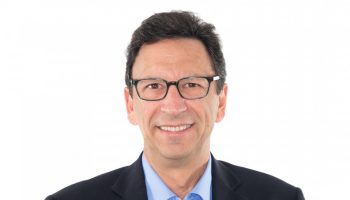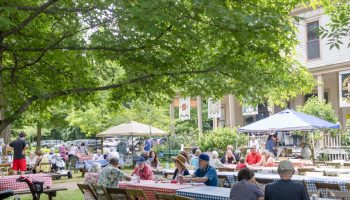[huge_it_gallery id=”98″]
Editor’s Note: These are the prepared remarks for Chautauqua Institution President Michael E. Hill’s annual Three Taps of the Gavel address, delivered at Sunday’s morning worship service in the Amphitheater.
Good morning, and welcome home to Chautauqua.
A special thank you to Jim Pardo and our entire board of trustees, to the staff of Chautauqua Institution which has worked tirelessly to shake the grounds from its winter slumber to prepare for this new season of exploration, and to each of you for your presence today, whether here in our beautiful Amphitheater or joining us online. Chautauqua is first and foremost a community, and so it follows that we simply could not do what we do without each of you.
On a personal note, I also want to welcome the family of my partner, Peter. Peter’s brother, Michael, his sister-in-law, Katherine, and his nephews, Jackson and Andrew, are joining us at Chautauqua for the first time. May this week be the start of your own love affair with this very special place.
Our winter months have been used preparing to welcome you all back. We recently launched a new guest service initiative with our staff, where we defined our service promise and asked each department to articulate and own the ways in which they distinctively play a role in delivering on it.
The ethos of our service promise centers on our commitment to curating memorable and meaningful experiences for Chautauquans of all ages, and we’ve been using the metaphor “setting the stage” as the core purpose of all who work here. Our job is to provide a framework. You do the real work by engaging with topics, with experiences, with all those who assemble in some form here.
At the President’s Office, we defined our role in this effort as serving as the “caretakers of community.” A daunting charge, to be certain, but it got me to thinking about the ways that we are called to care not just for community today, but for yesterday and for tomorrow.
So, as we gather together today at the beginning of our 145th Assembly, and learning the lessons of my inaugural Three Taps, please allow me to share with you three short stories of yesterday, today and tomorrow.
A Story of Yesterday
First, a story of yesterday.
Saint Augustine of Hippo defines the soul as “an assemblage of reasonable beings bound together by a common agreement as to the objects of their love.” The story of Chautauqua’s “yesterday” reads like a “who’s who” of luminaries who worked tirelessly to ensure that an idea that started in 1874 would be around far after the first tents were assembled in what we now call Miller Park. There are so many characters in our historic narrative that made Chautauqua the “object of their love,” but I’m struck that we begin this assembly on the heels of losing vic gelb.
vic gave tirelessly to Chautauqua. When he died last month at age 91, he had amassed a long list of awards and acknowledgements. As those who had the privilege of being in vic’s orbit know very well, none of those accolades mattered to him. What mattered most to him and to his incredible wife, Joan, was service to community. vic had his hands in almost everything here: capital campaigns, boards, task forces and special projects. There’s not much of the fabric of this sacred place that he did not touch.
I think of people like vic as we embark on writing a new strategic plan for Chautauqua. He was once quoted as telling a colleague who asked him how to manage organizations in a fast-changing world: “Don’t screw it up. Stay the course. You know what the mission statement is. … Follow it to a ‘T’ and tune out the noise.”
As we embark on this new chapter for Chautauqua, caring for our yesterday not only means following our founding mission, it also means doing so in a way that honors the contributions and legacy of people like vic. We can never lose sight of all those who came before us. Chautauqua’s today and tomorrow demand a deep reverence for its past and for all those who contributed in big and small ways to bring us to today.
A Story of Today
A story of today: The famed poet Maya Angelou once wrote, “Each new hour holds new chances for a new beginning.”
The story of today is a story of enthusiasm. Perhaps it’s the newness of this being only my second season as president, or the inescapable joy that comes from emerging from one of our roughest winters in recent memory, but Chautauqua seems to be almost vibrating with anticipation as we begin this assembly. While we have not yet written a new strategic plan, we have some sense of the topics we hope to tackle, and a new generation of people who share vic’s passion for service are coming forward to help us do this important work.
Our story of today shows up in the 7,000 young people from Chautauqua County who have turned our gates into gateways by participating in arts education programs in the past five months alone. The superintendent of Jamestown Public Schools recounts that two boys — both from families living in poverty and facing the cruel racism of being minorities — won the opera competition during the Chautauqua Opera Company’s residency. Their response to him was one of, “See, I told you we could do it.” Gates into gateways, indeed.
Our story of today is uplifted by people like four donors who are helping us fund a new diversity, equity and inclusion plan for Chautauqua. This is helping us to bring to our community Dr. Johnnetta Cole, the first female African-American president of both of our nation’s historically black women’s colleges — Spellman and Bennett. Dr. Cole will lead us in a dialogue and action plan to create and achieve our diversity and inclusion goals. Just this week, we gathered with 50 people in Bellinger Hall — trustees, staff, members of our Foundation board, our artists, members of denominational houses, local educators, and donors — to begin imagining what it might look like if we create the conditions for a Chautauqua where all colors, creeds and backgrounds not only are welcomed to our table but enthusiastically flock here to engage in our mission. It was a thrilling start to a longer effort.
Our story of today honors the legacy of David Lincoln, whom we also lost just this year, and his daughter Katie, who are ensuring that we have civil dialogue workshops and initiatives for six of our nine weeks. As historian Jon Meacham recently wrote, “The measure of our political and cultural health cannot be whether we agree on all things at all times. We don’t, and we won’t. Disagreement and debate — including ferocious disagreement and exhausting debate — are hallmarks of (the) American (experience).” Our American story can and must again have Chautauqua at its center, and central to that is our ability to engage in dialogue with those with whom we do not agree.
Our story of today comes in collaboration with Kent State University, as we open a new Poetry Makerspace in the Colonnade featuring the Traveling Stanzas interactive poetry exhibit. It comes in those reimagining our youth programming to attract more young people to the grounds and foster their growth as this community’s next generation of leaders. And it comes in a renewed partnership with our Chautauqua County neighbors focused on preserving and cleaning our beloved lake for future generations to enjoy.
Our story of today is one full of promise, and it propels us toward writing a story of tomorrow.
A Story of Tomorrow
And the story of tomorrow is the shortest one I have to share today because it’s not mine to write. The story of tomorrow is ours to fashion. We need you to help define the plot points for a narrative that we hope will never conclude.
That’s our charge this summer, simply put: to enter into dynamic dialogue both here on the grounds and also virtually as we imagine and re-imagine what Chautauqua can be for the world.
I have said to those with whom I’ve had early conversations about our need for a new blueprint for Chautauqua that it will not succeed unless we do it together and we share ownership of Chautauqua’s future.
Archbishop Desmond Tutu said it even better when he wrote:
“Here in South Africa, interconnectedness is described by the concept ubuntu. Ubuntu is the philosophy and belief that our humanity is inextricably bound up in one another, … Ubuntu tells us that we can create a more powerful world by striving for goodness in each moment, wherever we are. Thus, we are invited to become life artists, those who create lives of wholeness and beauty at every instant. Out of the cacophony of random suffering and chaos that can mark human life, the life artist sees or creates a symphony of meaning and order. A life of wholeness does not depend on what we experience, but on how we experience our lives.”
Or as Thomas Paine concludes: “We have it in our power to begin the world over again.”
That’s a charge Chautauqua has always taken seriously, as we together explore the best in human values — truly a timeless pursuit that is shaped by the challenges and opportunities of the day.
We have it in our power to begin the world over again.
We’ve done it in our yesterday.
We’re wrestling with it in our today.
We are called to compose the story of tomorrow, unlocking the essence of Chautauqua as a dynamic response to a world desperately in need of the best in human values.
What role will you play in this composition?
I’d like to think that the first Chautauquans were asking themselves this very question when they arrived in 1874. Imagine if we can muster the courage to respond with the same determination, vision and fortitude.
I tap the gavel three times.Chautauqua 2018 has begun.




